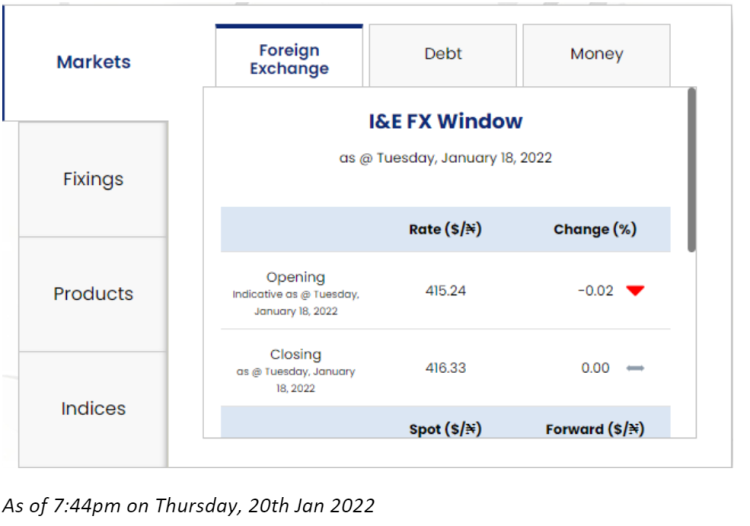The FMDQ, Nigeria’s main source for tracking the official exchange rate, has stopped publishing the official (I&E Window) exchange rates on its website at the end of business, depriving the public of critical transaction information.
This is based on observations from a variety of FMDQ users who use the data on a daily basis. Analysts at Nairametrics, who have been following the situation for the past ten days since it began, confirmed this. Since the window’s inception in 2017, the data has been published every day on the front page of the FMDQOTC’s website.
However, the FMDQ website now reports the official rate with a two-day delay, a decision that is expected to stymie Nigerian investors’ ability to make quick investment decisions while also depriving users of vital data.
Nigerians were denied access to critical information.
Tens of thousands of businesses in the country rely on the Investors & Exporters Window (I&E) official exchange rate when making business decisions such as imports and exports, FX balance conversions, payment for goods and services, and so on.
Foreign investors rely on it to determine the conversion rate for investments into the country. Academics, researchers, and the media use it to document and analyze the exchange rate and its impact on Africa’s most populous economy.
Not only did the FMDQ postpone the exchange rate’s closing price, but it also postponed the publication of opening and closing rates, daily highs and lows, and daily turnover. Other daily indices such as the money market rate, S&P Sovereign bond index, NIBOR, NAFEX, and NITTY rates were also affected.
Read also: NYSC is working to improve the digitalization of Work Environment
This change was first noticed on Monday, January 11th, 2022, when the rate as of the previous week’s close of trading was not updated. It was initially thought to be a website glitch, but nearly two weeks later, it appears the group is beginning to deprive the public of real-time data.

What is the reason for this?
Users of the data speculate that this is part of the Central Bank’s playbook, as the board of FMDQOTC is chaired by the Deputy Governor. The Central Bank has been widely chastised on social media for removing or delaying the release of important economic reports, particularly when the numbers are not encouraging.
According to a reliable source at the FMDQ, the decision was based on financial and business considerations, and the delay was intentional. According to the source, FMDQ recently revamped its product offering and decided to monetize close of day indicators data, which explains the two-day delay.
According to the source, anyone who wants to know the closing exchange rate and market turnover should either pay for it during close or business hours, or wait two days to get it for free.
FMDQ’s decision to delay vital data on its website home page is a significant departure from its rival Nigerian Exchange, which publishes vital stock market data while also offering a premium service for users who want more information and insights into trades, valuations, and other topics.
Last year, the Central Bank banned AbokiFX, an online blog that displays parallel market rates, citing allegations of rate fixing and manipulation.
How does this affect you?
- Nairametrics and other media outlets report the daily movement in the official market, which serves the purpose of feeding the investing public and FX interested Nigerians the latest changes in the official exchange rate.
- In addition, in May 2021, the Central Bank adopted the rate at the I&E window as its official exchange rate dropping decades-long use of a fixed exchange rate.
- The information, which is meant to educate and inform prompt decisions is now being intentionally withheld by the trading house, which should ideally feed the public with timely and accurate data.
- Suffice to add that the Central Bank clampdown on abokiFX last September suggests it prefers that Nigerians cite the FMDQ as the source for determining exchange rate and not the black market. This decision by the FMDQ to delay rates may not help this situation.
- Nigerians already rely on P2P websites to determine black market rates.















